|
Día de Publicación:
|
Enviar a:
|
Amid the present wave of criminalizing the Spanish language in a trans-border society which is Phoenix, Editorial Orbis Press continues to publish for the Spanish-reading community works which educate, enlighten, and entertain. Policies and politicians come and go, attitudes toward immigration and immigrants change, but a good book lasts forever. For his dedication and service to the community, Quepasa.com has named Dr. Manuel Murrieta Outstanding Hispanic, 2003.
Multilingual, not bilingual: Murrieta
Marco A. Delgado
Phoenix, Arizona.- After some time living in the United States, Mexican journalist-turned writer, Manuel Murrieta, created the Editorial Orbis Press to meet the needs of a Hispanic population lacking options to produce books in Spanish where English is the predominant language. Author of titles such as Gringos a la vista (Gringos in sight), in which Hispanics are those observing Americans, Murrieta speaks in an exclusive to Quepasa.com about issues in Hispanic journalism, the “English Only” law and a very important event for Hispanics in the U.S., the Hispanic Heritage Month (September).
QP: You were basically a journalist back in Mexico in your early days. What is the difference you see between Mexican journalism and Spanish-language journalism in the U.S?
MM: The main difference would be that Hispanic journalism within the U.S. is quite commercial. I understand that Mexican journalism is commercial too, but advertising is privileged here; these are media outlets especially created to serve big companies and big dealers, the contents of which will never be that important.
I have lived within Hispanic communities and realized there was this kind of Hispanic media “boom”; however, they lacked quality of content, design, presentation, and, above all, there was no Spanish literature production at all in the sense that no one wanted to produce it.
QP: How did the above-mentioned affect you as a writer?
MM: It’s something hard to explain because, let’s say you want to consolidate as a writer, giving your best shot in creativity and language; you will be writing in some way that local readers (Hispanic readers) might find a little hermetic or kind of learned… therefore, they won’t identify themselves with the book…your message will never get across.
QP: What was Editorial Orbis Press created for and why?
MM: When I was an Arizona State University student in Tempe I used to issue a cultural publication promoting literary creation that was called Culturadoor (now being published from Phoenix), in which were published poems, articles, short stories, etc. It was a creative publication in which all this literary and journalistic drive, written in Spanish, could see the light.
This magazine gathered a group of colleagues and scholars, which eventually led to the creation of a publishing house (…). The first books that came out of us [Orbis Press] were those of former University teachers of mine; this is how Editorial Orbis Press was born.
The name “Orbis” means “universe” in latin and is placed next to the Spanish word “Editorial” (publishing house) and the English word “Press”. So, Latin is surrounded by both the Spanish and English languages; the idea is to produce universal quality literature from the place we might be, which could be Phoenix, California or Hermosillo.
QP: What do you think about the “English Only” law?
MM: First of all, I think this is an act of ignorance, a backward step, a derivation of racism discrimination. We are repeating a series of stereotypes that have been renewed historically. I was asked my opinion on this law and on the bilingual education debate, to which I responded that the debate itself should not be, because you (Americans) are still arguing about English and Spanish while I am arguing about multilinguism.
This debate, for me, has no reason to be. It all comes down to the political and economic control by monolingual Americans who want to keep it, since they are now realizing that Hispanics are growing in economic power so rapidly that they regard it as competition. Therefore, this is a way of trying to stop them by depriving them of their culture because this culture [Hispanic] has become a business now – it sells. Spanish culture has turned into a way of non-dependence on Americans or English to really make it in this country.
QP: Do you think these kinds of laws will eventually damage the use of Spanish within the U.S. very badly?
MM: Arizona passed that law. Public schools cannot teach bilingual classes. But what’s really going on? Reality tells us otherwise; Spanish is being repressed but, on the other hand, a Spanish-language radio boom is on the rise, there are four Spanish-language international TV networks. Reality tells us that these language control laws cannot destroy reality itself. Spanish is still alive thanks to communities, whether educated or not, whether it is an official language or not.
QP: From your point of view, what does Hispanic Heritage Month mean?
MM: Hispanic Heritage Month? I feel this question can be answered from the very name of the celebration (…) This is another form of recognition American society is giving to the drive, success and achievements, as well as to the developments all U.S. Hispanics are carrying out.
It is a way of recognition, which is very good, because it means that Hispanic people are told to feel identified with their roots, their origin; they are told to deeply know their culture, their leaders, namely in politics and the arts. I hope cultural and artistic creations are also celebrated, since they have been overlooked for quite a while. (QUEPASA.COM. Translated by Oscar Montes.)
Published with the permission of “quepasa.com”.











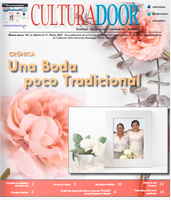
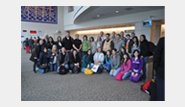

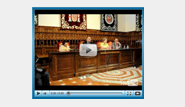


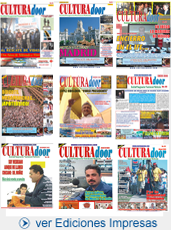
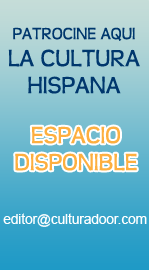




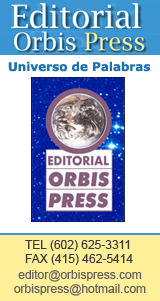

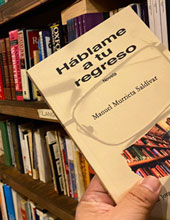
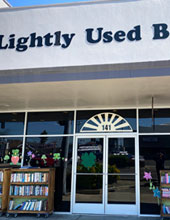
1 Trackback(s)